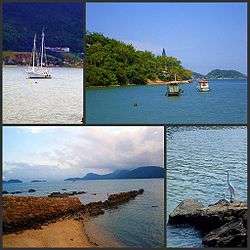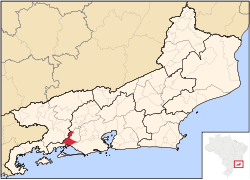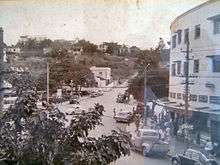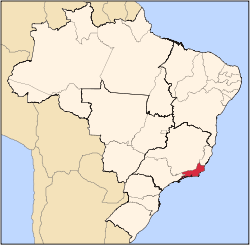Itaguaí
Itaguaí (Portuguese pronunciation: [itɐgwaˈi]) is a municipality located in the Brazilian state of Rio de Janeiro and contains several important iron ore loading ports of the world including Ilha Guaiba.[3] Its population was 125.913 in 2018 and its area is 273 km².[2] The city was founded in 1688 and lies midway between Rio de Janeiro and Angra dos Reis.[4]
Itaguaí | |
|---|---|
Municipality | |
| Município de Itaguaí | |
 | |
 Flag  Seal | |
| Nickname(s): Port city | |
 Location of Itaguaí in the state of Rio de Janeiro | |
 Itaguaí Location of Itaguaí in Brazil | |
| Coordinates: 22°51′07″S 43°46′30″W | |
| Country | |
| Region | Southeast |
| State | |
| Government | |
| • Prefeito | Carlo Bussatto Júnio (PMDB) |
| Area | |
| • Total | 273.414 km2 (105.566 sq mi) |
| Elevation | 15 m (49 ft) |
| Population (2018 est.[2]) | |
| • Total | 125,913 |
| • Density | 460/km2 (1,200/sq mi) |
| Time zone | UTC-3 (UTC-3) |
| Website | |

Itaguaí is located approximately 75 km west of the city of Rio de Janeiro on the road to Santos (SP). It is located between the shore of Sepetiba Bay and the Atlantic Rainforest.[5]
Itaguai and the region around it contain some of the largest ore exporting ports in Brazil.[6][7] It also serves also as dormitory town for workers of the industrial western zone (Zona Oeste) of Rio de Janeiro. It is the seat of the Roman Catholic Diocese of Itaguaí.
Port of Itaguai (Sepetiba / Guaiba island)
The Port of Itaguai was opened as a deepwater port in 1982, primarily to export alumina and other minerals found in the Minas Gerais region. It includes ports of Itaguai, Sepetiba and Guaiba island.[8][9] The port of Sepetiba is located in the port of Itaguaí.[10] As of August 2018, the port accommodates large bulk carriers (170,000 deadweight).[11] The Port of Sepetiba is further divided into two administrative regions - Sepetiba Bay and Sepetiba terminal.[12]
The Port of Guaíba island (also known as Ilha Guaiba terminal)[13][14], located close by has separate terminals for exporting mineral ores, but is privately owned by the mining company Vale and comes under the authority of the Port of Itaguai (Rio de Janeiro).[15] Guaiba consists of deep water berths for loading the largest bulk carriers in the world, but has no residents and no road connections.[16] Iron ore reaches the terminal through a railway bridge that connects the island to the mainland, and further, to the Vale mines in Minas Gerais.[17] In March 2019, the port, which exports 40 million tonnes of iron ore each year, was closed by the local municipality due to excessive pollution and after the Brumadinho disaster in another mine in Brazil.[18] The closure was short though, as a court injunction was granted to Vale a day later and the port resumed operations.[19]
References
- "Brazilian Institute of Geography and Statistics". 2017. Retrieved 27 March 2019.
2018 Area Total
- "Brazilian Institute of Geography and Statistics" (PDF). 2018. Retrieved 6 March 2019.
2018 Estimates of Population
- Port Information book - Ilha Guaiba (PDF). Vale. Retrieved 22 April 2019.
- Sailing Directions - East coast of Brazil (13th ed.). Taunton: UKHO.
- "Sepetiba tecon - a profile". bnamericas.com. BN Americas. Retrieved 5 September 2018.
- "Port of Itaguai and Port of Guaiba island". vale.com. Vale. Retrieved 5 September 2018.
- Guide to port entry. London: World ports guides.
- "Is iron ore the next copper?" (PDF). cmegroup.com. Platts. Retrieved 5 September 2018.
- "Official website - Port of Itaguai". portosrio.gov.br (in Portuguese). Ports rio. Retrieved 5 September 2018.
- "Itaguai port". marinetraffic.com. Marine traffic. Retrieved 5 September 2018.
- "Still room for Sepetiba in latest box pecking order". Port Strategy. 25 March 2009. Retrieved 5 September 2018.
- "Sepetiba bay". port-directory.com. Port Directory. Retrieved 5 September 2018.
- "The Ports of Guaiba and Itagui". Vale official website. Vale. Retrieved 22 April 2019.
- Investigation report - the sinking of Stellar Daisy (PDF). Virginia USA: registry of The Marshall Islands. 18 April 2019. Retrieved 22 April 2019.
- "CSN Receives 10 Offers for Brazil Box Terminal". Marine Link. 8 January 2016. Retrieved 5 September 2018.
- "Our mines and How Iron ore is made - Interactive Infographic". www.vale.com. Vale. Retrieved 22 April 2019.
- "Itaguai port pins hopes on extra trans Atlantic calls". JOC. Retrieved 5 September 2018.
- "Brazilina town fines Vale, closes port terminal in Rio de janeiro state". Reuters. 12 March 2019.
- "Brazil's Vale to resume operations are port after court injunction". Reuters. 19 March 2019.
